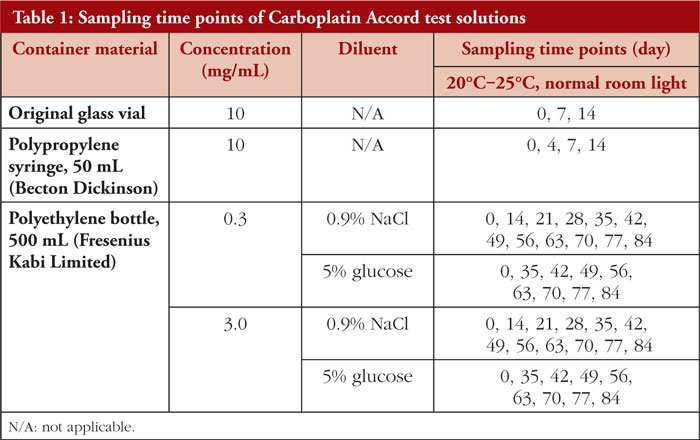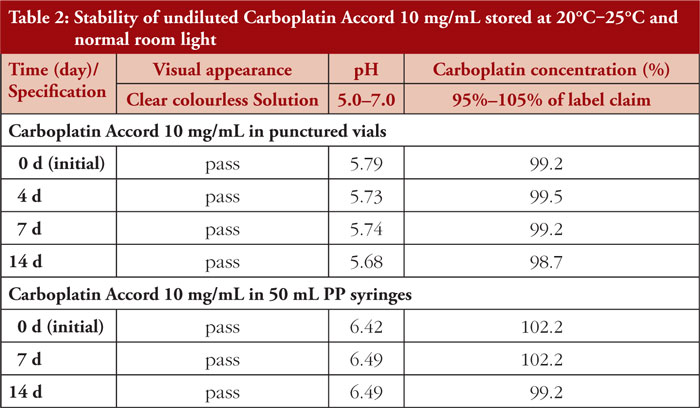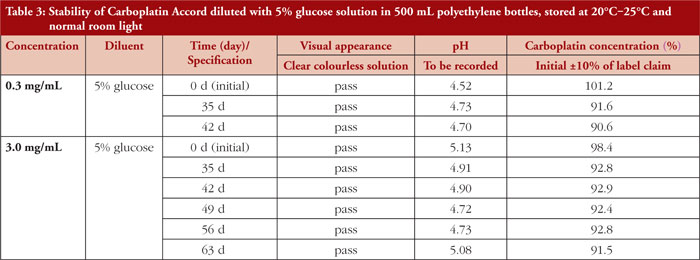Physicochemical stability of Carboplatin Accord in punctured original vials, syringes and after dilution with 0.9% sodium chloride or 5% glucose solution
Published on 2024/09/11
Generics and Biosimilars Initiative Journal (GaBI Journal). 2024;13(2):93-5.
Author byline as per print journal: Irene Krämer, PhD; Frank Erdnuess, PhD; Judith Thiesen, PhD
|
Study objectives: To determine the physicochemical stability of undiluted Carboplatin Accord 10 mg/mL in punctured original vials and polypropylene (PP) syringes as well as after dilution with commonly used infusion fluids in polyethylene (PE) bottles at two different concentrations (0.3 mg/mL, 3.0 mg/mL). |
Submitted: 29 February 2024; Revised: 15 April 2024; Accepted: 26 April 2024; Published online first: 6 May 2024
Introduction
Carboplatin belongs to the platinum II-complex antineoplastic agents. The platinum complex consists of two ammonium ligands and a bidentate cyclobutene-dicarboxylate ligand. Hydrolytic reactions give activated platinum species, which cause inter- and intra-strand DNA crosslinks, thereby inhibiting replication and transcription. The main indications of carboplatin are first- and second-line therapy of advanced ovarian and small cell lung cancer [1]. According to the Summary of Product Characteristics (SmPC), prior to administration, Carboplatin Accord 10 mg/mL must be diluted with 5% glucose or 0.9% sodium chloride solution to concentrations lower than 0.5 mg/mL.
The physicochemical stability of these diluted infusion solutions is maintained for 24 hours at room temperature and 30 hours at 2°C–8°C [1]. In the presence of chloride ions, carboplatin is degraded to cisplatin by nucleophilic substitution of the organic ligand by two chloride ions [2–4]. The stability of carboplatin after dilution with 0.9% sodium chloride solution is limited, whereas the physicochemical stability of various carboplatin containing brand products diluted with 5% glucose solution is established for up to 30 days at room temperature and 84 days at 2°C–8°C [5–7].
Study objectives
To determine the physicochemical stability of Carboplatin Accord 10 mg/mL in punctured original vials, 50 mL PP syringes, and after dilution with 0.9% sodium chloride or 5% glucose solution in 500 mL PE bottles at two concentrations (0.3 mg/mL, 3.0 mg/mL), stored at room temperature (20°C–25°C) for a maximum period of 84 days.
Methods
The carboplatin test solutions were prepared under EU Class A conditions and in accordance with the principles of Good Manufacturing Practice. A total of six different test solutions were prepared by using the European Medicines Agency’s (EMA) licensed Carboplatin Accord 10 mg/mL (batch numbers N02269, M10770). The test solutions were stored at room temperature (20°C–25°C) without light protection for up to 84 days. Samples were taken and analysed initially (Day 0) and at further predetermined time points. Analysis would be discontinued if the results were outside the limits at any time point. For detailed information see Table 1.
The physical stability was assessed by pH measurements (using a glass electrode calibrated with standard buffer solutions) and visual inspections under standard laboratory light conditions against a black and white background, checking for any changes in colour, clarity, or the presence of particulate matter.
Chemical stability was assessed via high-performance liquid chromatography (HPLC) assay, which has been validated for linearity of analytical response and acceptable precision [8]. The assay was proven to be stability-indicating for non-specific degradation of the parent drug. For the undiluted solution, the acceptance level was set to 95%–105% of the label claim. Acceptance criteria for diluted solutions were defined as initial ±10% of the label claim [8].
Results
Carboplatin Accord 10 mg/mL concentrate in punctured vials as well as in PP syringes remained unchanged and thereby physicochemically stable for 14 days when stored at 20°C–25°C and under normal room light. Neither colour changes, nor turbidity, nor visible particles were noticeable during visual inspection. Results of pH measurements showed only slight variations (about 0.1 unit) during the observation period. Slight variations of the carboplatin concentrations measured at different time points are related to the assay variability, see Table 2.
Carboplatin test solutions diluted with 5% glucose solution to the concentrations 0.3 mg/mL and 3.0 mg/mL remained physicochemically stable when stored at 20°C–25°C under normal room light for 42 days and 63 days, respectively. After these time points carboplatin concentrations fell below the acceptance limit of initial ±10% of the label claim. For detailed results, see Table 3. These results are consistent with published data reporting less than 5% loss in carboplatin concentration after 28 days (1 mg/mL, 5% glucose solution) [5] and 30 days (3.2 mg/mL, 5% glucose solution) [6] of storage at room temperature.
Carboplatin solutions diluted with sodium chloride failed the acceptance limit after just 14 days of storage (the first sampling time point). Carboplatin concentrations were 67% (0.3 mg/mL) and 75% (3.0 mg/mL) of the initial concentration. In parallel, pH values increased significantly (see Table 4). The sampling time points were not adequate to determine the exact interval at which carboplatin concentrations fell below the acceptance criteria of 90% of initial concentration.
Conclusion
Carboplatin Accord solution concentrate, 10 mg/mL, remained physicochemically stable after the first opening in punctured original glass vials and after transfer into PP syringes for 14 days when stored at 20°C–25°C under normal room light.
After dilution with 5% glucose infusion solution, carboplatin test solutions revealed to be physicochemically stable for 42 days (0.3 mg/mL) and 63 days (3.0 mg/mL) when stored at room temperature and normal room light. Due to rapid degradation rates, dilution of carboplatin with 0.9% sodium chloride diluent solution should be avoided.
Residues of Carboplatin Accord 10 mg/mL in punctured original vials and PP syringes can be used cost-effectively for up to 14 days when stored at room temperature and normal room light. Provided that 5% glucose solution is used as diluent, Carboplatin Accord infusion solutions of 0.3 mg/mL and 3.0 mg/mL may be prepared in advance by pharmacy-based cytotoxic units and used over a period of 42 days and 63 days, respectively.
Analysis was performed and documented by an accredited external lab. Results were carefully checked for plausibility and cautiously interpreted.
Funding sources
This study was funded by Accord Healthcare.
Competing interests: The authors Irene Krämer, Frank Erdnuess, and Judith Thiesen have no competing interests to declare.
Provenance and peer review: Not commissioned; externally peer reviewed.
Authors
Professor Irene Krämer, PhD
Frank Erdnuess, PhD
Judith Thiesen, PhD
Department of Pharmacy, University Medical Center of the Johannes Gutenberg University Mainz, 1 Langenbeckstraße, DE-55131 Mainz, Germany
References
1. Accord Healthcare Limited. Summary of product characteristics for Carboplatin Accord 10 mg/mL concentrate for solution for infusion. Available from: https://cdn.accordhealthcare.com/ie/public/spc/downloadspc_carboplatin_10mg.pdf
2. Cheung YW, Cradock JC, Vishnuvajjala BR, Flora, KP. Stability of cisplatin, iproplatin, carboplatin, and tetraplatin in commonly used intravenous solutions. Am J Hosp Pharm. 1987;44(1):124-30.
3. Perrone RK, Kaplan MA, Bogardus JB. Extent of cisplatin formation in carboplatin admixtures. Am J Hosp Pharm. 1989;46(2):258-9.
4. Trittler R, Jung B, Strehl E. Ist teurer immer auch besser? Krankenhauspharmazie. 2001;7:331-3.
5. Rochard E, Barthes D, Courtois P. Stability and compatibility study of carboplatin with three portable infusion pump reservoirs. Int J Pharm. 1994;101(3):257-62.
6. Prat J, Pujol M, Girona V, Muñoz M, Solé LA. Stability of carboplatin in 5% glucose solution in glass, polyethylene and polypropylene containers. J Pharm Biomed Anal. 1994;12(1):81-4.
7. Kaestner S, Sewell G. A sequential temperature cycling study for the investigation of carboplatin infusion stability to facilitate ‘dose banding’. J Oncol Pharm Pract. 2007;13(2):119-26.
8. Accord Healthcare Limited. Data for HPLC assay and acceptance criteria on file; 04-02-14.
|
Author for correspondence: Judith Thiesen, PhD, Department of Pharmacy, University Medical Center of the Johannes Gutenberg University Mainz, 1 Langenbeckstraße, DE-55131 Mainz, Germany |
Disclosure of Conflict of Interest Statement is available upon request.
Copyright © 2024 Pro Pharma Communications International
Permission granted to reproduce for personal and non-commercial use only. All other reproduction, copy or reprinting of all or part of any ‘Content’ found on this website is strictly prohibited without the prior consent of the publisher. Contact the publisher to obtain permission before redistributing.






